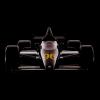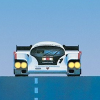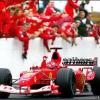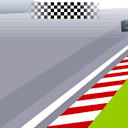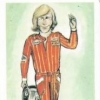Just watched one of the most thrilling races this year of any sort. The final of the men's team pursuit cycling.
For those who do not know what that's about, you have two teams of four that start either side of the velodrome. The idea is to catch the other team up inside 4,000 metres. Hence pursuit. In practice this rarely happens in an Olympic final, so the result is on the time.
Not all four need to finish though. The time is taken from the third bike. What this means is that someone usually does a bit more work than the other three, breaking the air and creating the necessary slipstream, and drops out near the end. They take turns up front, of course, and the transition is a work of art, trying to keep the same speed and momentum without losing touch with your team-mates - or worse, taking them out.
The final was Britain v Australia. Britain had a bad start and Australia got a lead of 0.7s at half-distance. But their fourth rider dropped out earlier than expected, which slowed the Aussies. Britain then caught back and back, and took a tiny lead with a couple of laps left - when the fourth British rider dropped back, and, on the final transition, a gap appeared in the British threesome.
But Australia had gone too fast, too soon, and Britain put in a monster final lap for a world record.
The lesson?
There was zero overtaking action in the race, other than against the clock. The crowd oohed when the Australian lead dropped to 0.01s and cheered when Britain overtook (obviously a very British crowd).
Nobody thought "I can't follow this, this is rubbish, I have no idea who is winning."
Instead everyone was absorbed, enraptured, captivated.
In the same way, one of the most astonishing GPs in the last quarter-century was Japan 1994, in the monsoon wet. And why was it so astonishing, thrilling, amazing? Because it was so tense. And why was it tense? Because the racing was against the clock.
Ergo. The lesson to learn.
When a race is red-flagged, drop this stupid, cretinous, insane, moronic and completely, totally and utterly unfair practice of re-setting the clock to zero.
I.e. go back to the old system of having aggregate times. It's against the clock? Yes. So what? It means that it's easier to overtake, for starters, you don't need to do it on track if you are having to catch a deficit but lead on the road. But it means a different skill is rewarded - and it makes it so much more exciting when cars are separated and racing against a chimera. Obviously not all the time, but in those rare circumstances when the red comes out, it adds a very different dimension.
I think somehow the world can cope with aggregate times.
Indeed, the world somehow coped with cars racing the clock in every Grand Prix until 1921...








